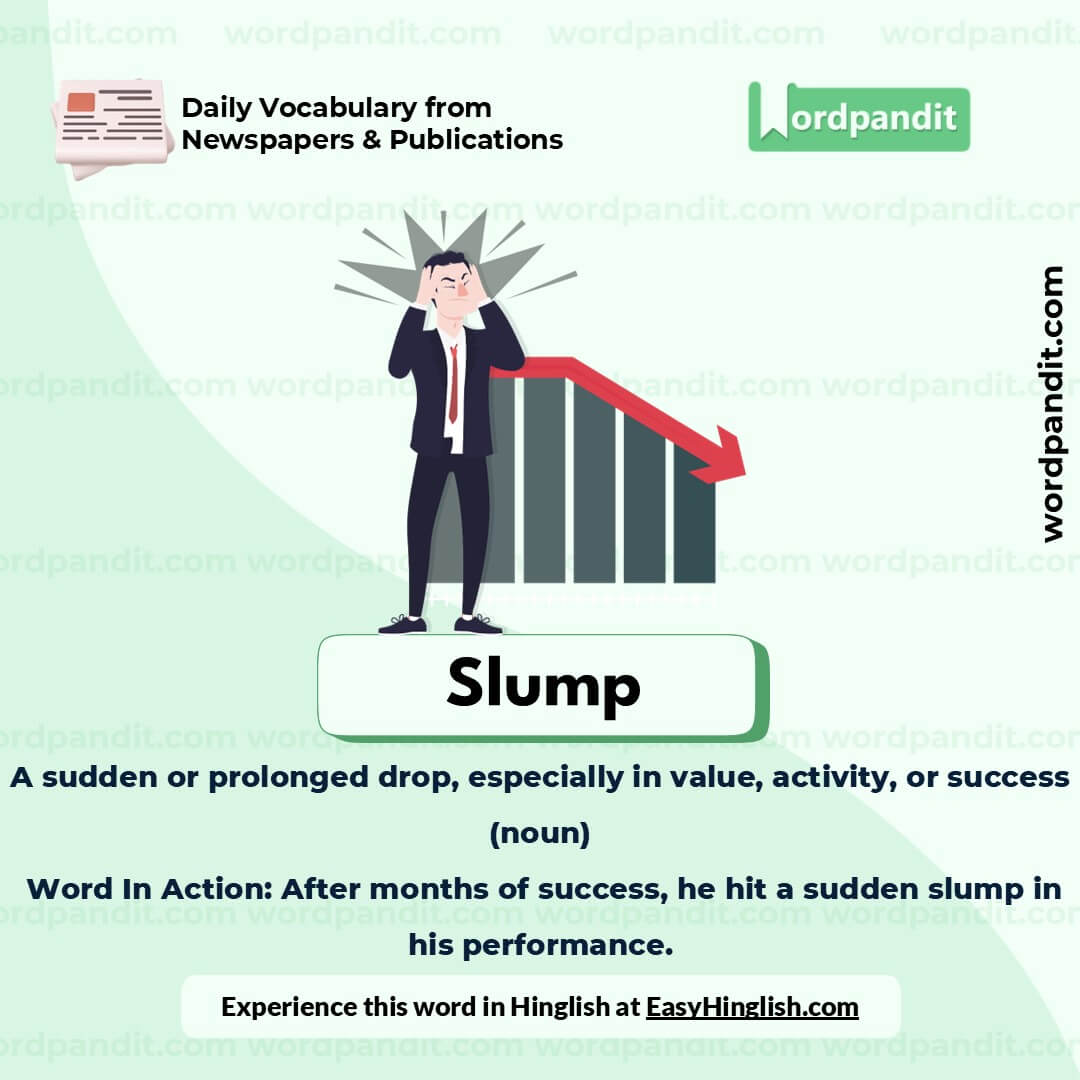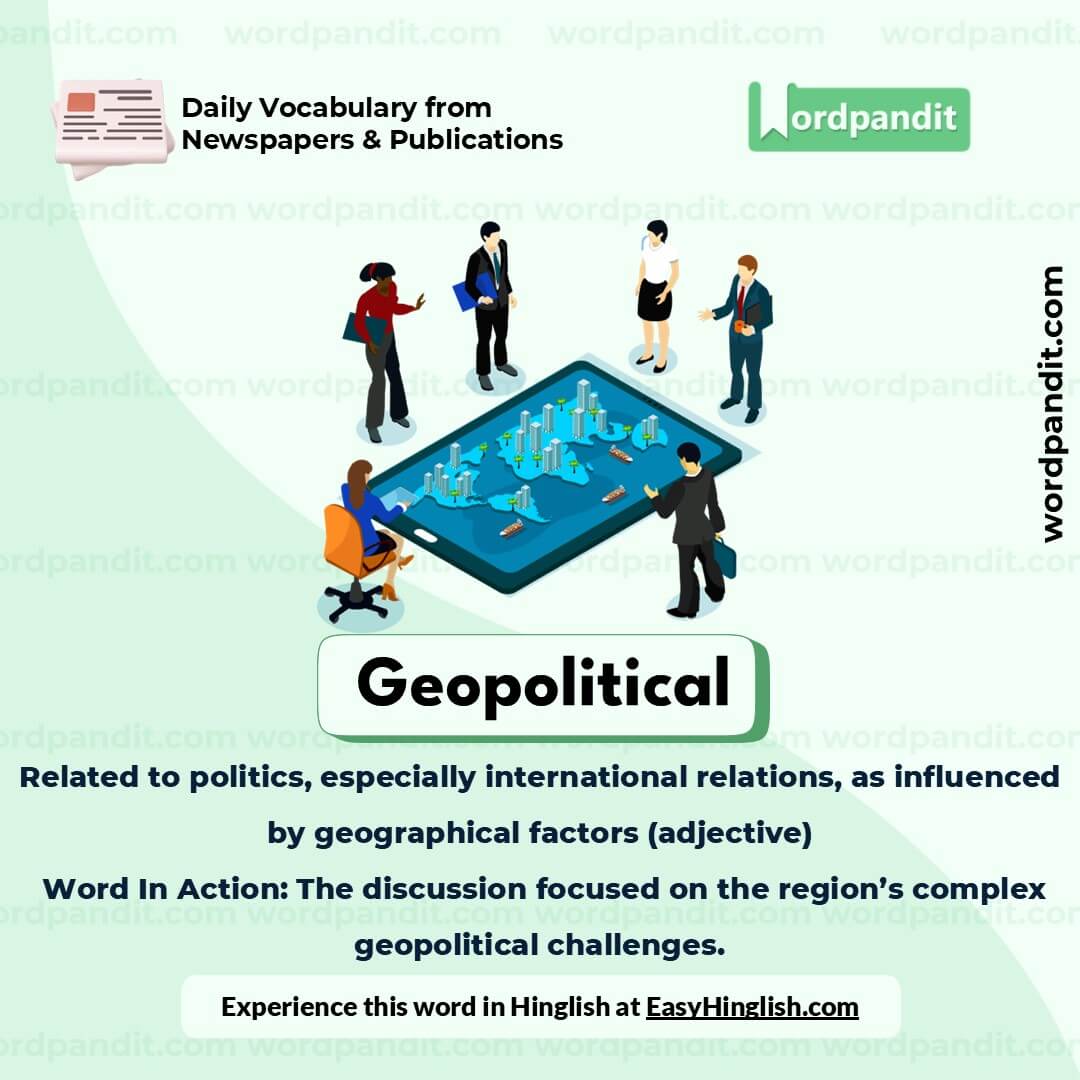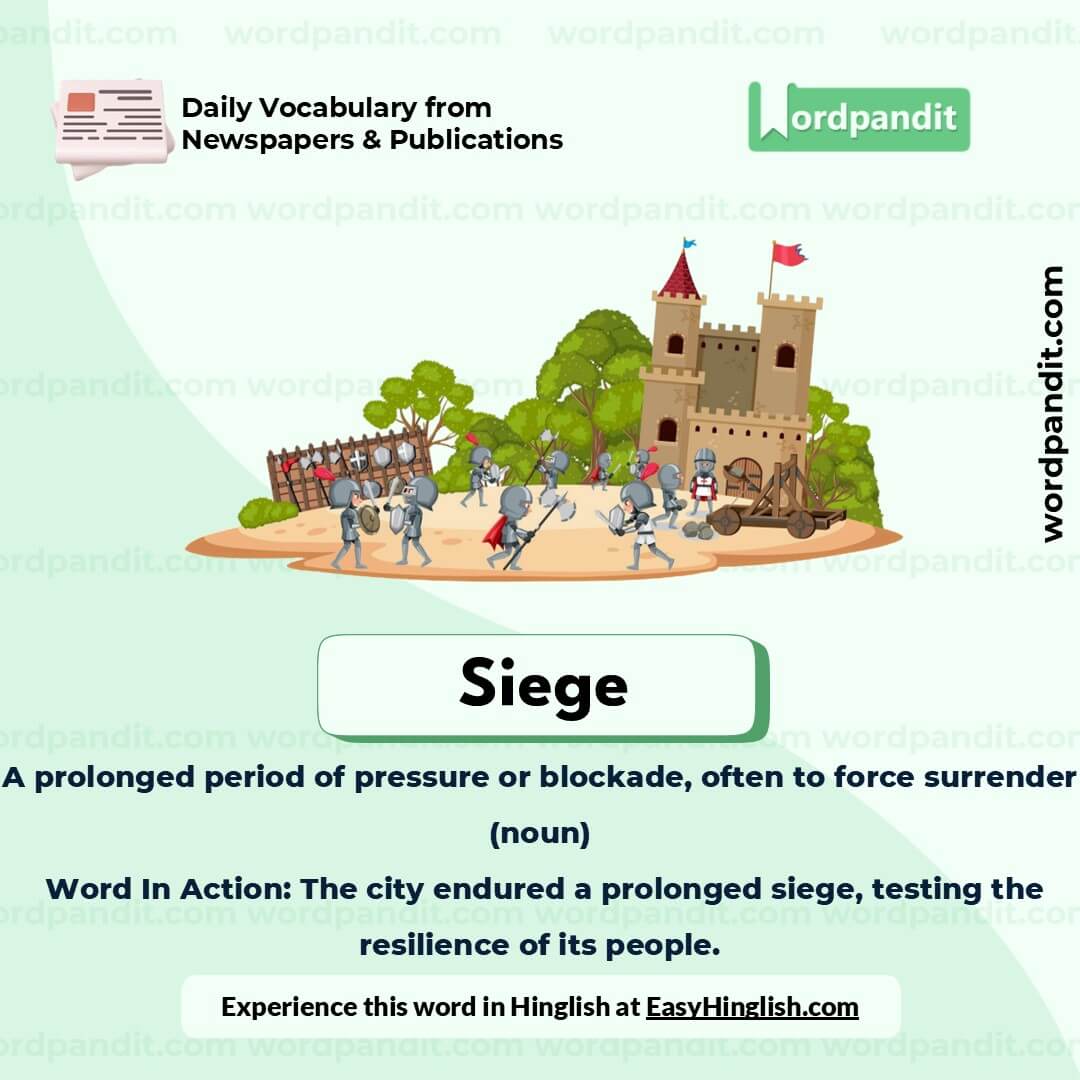Daily Vocabulary from Indian Newspapers and Publications
Welcome to Wordpandit’s Indian Vocabulary Hub
At Wordpandit, we understand the importance of staying rooted in the local context while expanding your language skills. This section focuses on enriching your vocabulary with words and phrases drawn from India’s leading newspapers and publications, ensuring you're learning vocabulary that is practical, relevant, and uniquely Indian.
Why Indian Sources Matter
We believe that the best way to master any language is by immersing yourself in local content. That’s why we carefully curate vocabulary from top Indian publications, including:
- The Hindu
- The Times of India
- The Economic Times
- Hindustan Times
- Live Mint
- The Indian Express
- And many others...
Stay Updated, Stay Relevant
With daily updates from Indian news sources, you’ll be consistently learning words that reflect the trends and shifts in Indian society and culture. Our focus is to provide vocabulary that enhances your understanding of the language in an Indian context.
How Wordpandit Supports Your Goals
Whether you’re preparing for exams, aiming to improve your professional communication, or simply want to stay connected with the latest Indian vocabulary, Wordpandit is here to guide you every step of the way.
Learn with a Practical Approach
Our interactive learning methodology includes real-world examples, engaging activities, and context-specific usage to ensure that every word becomes part of your active vocabulary.
Dive into Indian Vocabulary Today!
Why Choose Wordpandit?
Practical Learning: Focus on words you'll actually encounter in real-world reading, enhancing your comprehension and communication skills.
Diverse Content: From current affairs to scientific breakthroughs, our varied sources expose you to vocabulary across multiple domains.
Effortless Integration: Make Wordpandit a part of your daily routine. Just a few minutes each day can significantly boost your lexicon over time.
Your Path to Vocabulary Mastery
- Visit our Daily Vocabulary section regularly
- Explore new words and their usage in context
- Practice incorporating these words into your own writing and speech
- Track your progress as your vocabulary expands
Start Your Journey Today
Embark on your vocabulary enhancement journey with Wordpandit. By consistently engaging with our daily posts, you'll build a robust vocabulary that serves you well in academic, professional, and personal contexts.
Remember, a word a day keeps linguistic limitations at bay. Make Wordpandit your daily companion in the quest for vocabulary excellence!
WORD-1: Fervently
Context:
"This Diwali, Bollywood has been praying more fervently than ever before to Lakshmi as the fate of two big franchise films—Singham Again and Bhool Bhulaiyaa 3—hang in balance at the box office." - The New Indian Express
Explanatory Paragraph:
The word fervently describes doing something with intense passion, deep emotion, or sincere enthusiasm. When someone acts fervently, they are deeply invested, pouring energy and heart into their actions or beliefs. In the context above, Bollywood is intensely hoping for success as they seek prosperity for their big releases.
Meaning: With intense passion or enthusiasm (adverb)
Pronunciation: FUR-vuhnt-lee
Difficulty Level: ⭐⭐⭐ (Intermediate)
Etymology: From Latin fervere meaning "to boil" or "to glow," highlighting strong emotion or enthusiasm
Synonyms & Antonyms:
Synonyms: passionately, ardently, intensely, zealously, enthusiastically
Antonyms: indifferently, apathetically, dispassionately, coldly
Usage Examples:
- She spoke fervently about her love for art, inspiring everyone around her.
- The fans cheered fervently as their team scored the winning goal.
- Activists are fervently advocating for climate action worldwide.
- He prayed fervently for his family's safety during the storm.
Cultural Reference:
"Pray as though everything depended on God. Work as though everything depended on you." - Saint Augustine, highlighting fervency in both faith and effort.
Think About It:
Can fervent beliefs sometimes cloud judgment, or do they strengthen one's purpose?
Quick Activity:
Think of something you feel passionately about and write a sentence expressing your feelings fervently.
Memory Tip:
Remember "fervently" by thinking of "fever" or "fire"—both suggest intensity and strong feeling.
Real-World Application:
"Fervently" can be used to describe actions or beliefs that are deeply sincere, such as a person's commitment to a cause or their passionate dedication to a hobby or profession.
WORD-2: Fickle
Context:
"Will both of them bring the fickle audience to theatres over the festive weekend, when ticket sales are meant to rise? Or will they split the viewers and eat into each other’s profits?" - The New Indian Express
Explanatory Paragraph:
The term fickle refers to someone or something that is unpredictable or constantly changing. A fickle person or audience often switches loyalties, opinions, or interests quickly. Here, it suggests that the audience may not consistently support a single movie, making it challenging to predict box office success.
Meaning: Prone to sudden changes, especially regarding loyalty or preferences (adjective)
Pronunciation: FIK-uhl
Difficulty Level: ⭐⭐ (Moderate)
Etymology: Derived from Old English ficol meaning "deceitful or changeable"
Synonyms & Antonyms:
Synonyms: capricious, unpredictable, changeable, volatile, unstable
Antonyms: stable, steadfast, consistent, reliable, constant
Usage Examples:
- The weather in the mountains can be quite fickle, shifting from sunny to stormy within minutes.
- Her tastes in music are fickle; she likes one genre one day and a completely different one the next.
- Investors find it hard to trust fickle markets that fluctuate without warning.
- He has a fickle personality, often changing his mind without any clear reason.
Cultural Reference:
In Shakespeare's play "Romeo and Juliet," love is often described as fickle, emphasizing how easily emotions can shift.
Think About It:
What factors might make a person or audience fickle? Is this trait always negative?
Quick Activity:
Think of a time when you or someone else was fickle about a choice. Write a sentence describing what caused the change of heart.
Memory Tip:
Associate "fickle" with "flicker," as both suggest something that changes rapidly or unpredictably.
Real-World Application:
Using "fickle" can help describe situations or people that are unreliable, like fluctuating market trends or the inconsistent choices of a customer base.
WORD-3: Slump
Context:
"Most importantly, will they help make a success of 2024, which has been marked by a slump after an incredible run in 2023? Or will it be back to the gloom and doom of the disastrous 2022 after the hope and cheer of Pathaan, Gadar 2, Animal and Jawan last year?" - The New Indian Express
Explanatory Paragraph:
The term slump refers to a significant and often sudden decline, especially in economic performance or success. When a market or industry experiences a slump, it undergoes a downturn, marked by reduced productivity, sales, or interest. In the context above, it highlights a period of decreased box office success following a previously successful year.
Meaning: A sudden or prolonged drop, especially in value, activity, or success (noun)
Pronunciation: sluhmp
Difficulty Level: ⭐⭐ (Moderate)
Etymology: Originating in the early 17th century, likely imitative of the sound of something falling or sinking heavily
Synonyms & Antonyms:
Synonyms: decline, downturn, recession, drop, dip
Antonyms: rise, boom, increase, surge, upswing
Usage Examples:
- The company experienced a sales slump after the holiday season.
- Due to economic instability, there was a slump in housing prices.
- Her energy levels tend to slump in the late afternoon.
- The team’s performance slumped after the star player was injured.
Cultural Reference:
In sports, a "slump" refers to a period where a player or team performs below their usual standard, such as a batting slump in baseball when a player struggles to hit well.
Think About It:
What might cause a person or industry to experience a slump, and how can they work to overcome it?
Quick Activity:
Describe a time when you noticed a slump in a certain area of your life or in a trend. How did you or others respond to it?
Memory Tip:
Think of a slump as a "slip" downwards in success, as both words suggest a drop or decline.
Real-World Application:
The term "slump" is often used in business and sports to describe a period of reduced performance, making it a common term in financial reports, sports commentary, and media.
WORD-4: Geopolitical
Context:
"Going purely by decibels on TV screens and social media, it would seem India’s in a constant state of geopolitical siege. Bangladesh has had a street enforced regime change replacing an India-friendly PM and Sri Lanka has thrown a surprise by electing a left-wing president." - The Times of India
Explanatory Paragraph:
The word geopolitical refers to the influences of geography on politics, especially regarding international relations and global power dynamics. It describes the ways in which countries interact based on geographic factors, resources, strategic locations, and neighboring states. In the context above, India is portrayed as being affected by regional political shifts, impacting its geopolitical stance and relations.
Meaning: Related to politics, especially international relations, as influenced by geographical factors (adjective)
Pronunciation: jee-oh-puh-LIT-ih-kul
Difficulty Level: ⭐⭐⭐⭐ (Advanced)
Etymology: From Greek geo meaning "earth" and politikos meaning "of citizens or states"
Synonyms & Antonyms:
Synonyms: international, diplomatic, global, transnational, political
Antonyms: domestic, local, internal
Usage Examples:
- The geopolitical tensions between neighboring countries have led to stricter border controls.
- Climate change has become a significant geopolitical issue, impacting international policies and agreements.
- Energy resources play a major role in shaping the geopolitical alliances of many nations.
- With shifting power dynamics, the region has become a focal point of geopolitical interest.
Cultural Reference:
The Cold War was a major geopolitical struggle between the United States and the Soviet Union, highlighting the impact of geography and alliances on global power relations.
Think About It:
How do you think geographical location impacts a country's political influence and relationships with others?
Quick Activity:
Identify one current geopolitical issue and briefly describe how geography influences the situation.
Memory Tip:
Remember "geopolitical" by breaking it down: "geo" (earth) + "political"—how geography influences political power and relations.
Real-World Application:
"Geopolitical" is commonly used in news and analysis to discuss global power structures, international policies, and how countries' physical locations affect their political interactions and conflicts.
WORD-5: Siege
Context:
"Going purely by decibels on TV screens and social media, it would seem India’s in a constant state of geopolitical siege. Bangladesh has had a street enforced regime change replacing an India-friendly PM and Sri Lanka has thrown a surprise by electing a left-wing president." - The Times of India
Explanatory Paragraph:
The term siege originally describes a military tactic where an area or city is surrounded by forces to cut off supplies and force surrender. In a broader, figurative sense, it represents a state of ongoing pressure, harassment, or threats. Here, "geopolitical siege" implies that India is feeling constant pressure from neighboring countries' political shifts, affecting its sense of security.
Meaning: A prolonged period of pressure or blockade, often to force surrender (noun)
Pronunciation: seej
Difficulty Level: ⭐⭐⭐ (Intermediate)
Etymology: From Old French sege meaning "a seat" or "blockade," reflecting the idea of surrounding and waiting
Synonyms & Antonyms:
Synonyms: blockade, encirclement, harassment, pressure, assault
Antonyms: relief, liberation, aid, assistance
Usage Examples:
- The medieval castle was under siege for weeks until its defenders finally surrendered.
- Workers felt they were under siege from endless demands and deadlines.
- The town endured a month-long siege before supplies were air-dropped to the residents.
- Online trolls placed the author under a virtual siege, filling her inbox with messages.
Cultural Reference:
The Siege of Troy, a famous episode from Greek mythology, describes how the Greek army surrounded Troy for ten years, aiming to capture it through persistent pressure and warfare.
Think About It:
In what ways can people or organizations feel "under siege" in modern society, and how can they respond to such pressures?
Quick Activity:
Think of a scenario where you felt "under siege," whether from stress, demands, or responsibilities. Describe what it felt like and how you managed it.
Memory Tip:
Remember "siege" by thinking of "seize"—when forces surround a place, they aim to seize control through constant pressure.
Real-World Application:
"Siege" is used in both literal and figurative contexts to describe situations of intense pressure or attack, making it a versatile term in discussions of conflict, stress, and challenges.


















